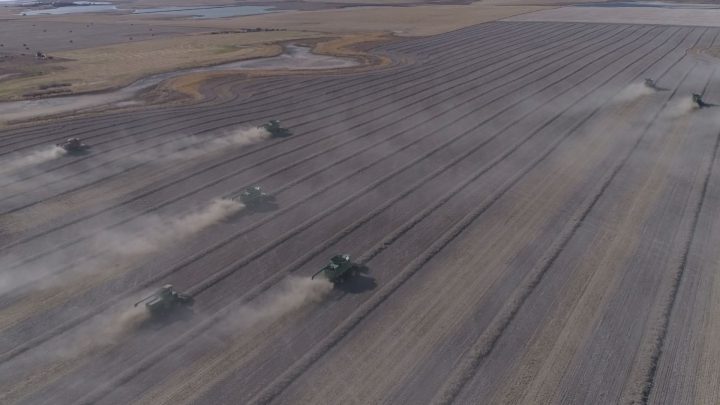An Agricultural Producers Association of Saskatchewan (APAS) survey is shedding light on just how significant an impact the 2021 drought has had on some farmers.

The optional survey has so far received more than 200 responses, 75 per cent of which reported being unable to fulfil their 2021 grain contracts.
“Some respondents included that they are facing bankruptcy due to drought and contract shortfalls,” reads an APAS news release on the subject.
It says “25% of respondents also said they had trouble contacting the grain buyers resolving issues arising from production shortfalls, and many of the respondents said they will not be working with the same grain company in the future or will not be signing a contract again.”
Speaking to Global News Tuesday, APAS President Todd Lewis acknowledged that the drought meant fulfilling contracts hasn’t been easy for “either side” and added producers will likely be more cautious with their plans moving forward.
“It’s tough on the grain companies as well. They don’t want to be in this position but unfortunately the dry weather has come, the contracts are signed and now it’s time to settle these contracts and it’s not fun for either side,” he said, adding that difficult years are part of the industry and need to be accommodated.
“I think producers are looking for a better contract to sign going into next year. It’s still dry. We’re a long way form being out of this drought.”
The APAS release also points out producers with low yields have had to pay “penalties and administrative fees between $20,000 and $300,000 to grain companies.”

Get daily National news
“Many of the respondents also said the interest on their unpaid contracts was as high as 19%,” the release continues.

Western Grain Elevator Association (WGEA) spokesperson Wade Sobkowich, meanwhile, said its the organization’s belief that some farmers “over-contracted” and took on too much risk.
“When a grain company needs to set replacement value to a farmer who doesn’t have enough production, it’s not because the grain company is making money. Grain companies are scrambling to have enough grain to meet their own commitments,” he said.
“Grain companies are buying those tonnes from other farmers at very high prices right now, we know that there are producers in Western Canada who are benefitting from not having taken on so much risk and not having forward contracted as much.”
He added, though, that WGEA members will be “examining their processes” when it comes contracting producers.
“It would be unwise for anybody to come out of an unprecedented situation like we’ve just experienced without trying to learn from it. But it’s a competitive issue,” he said.
Saskatchewan Agriculture Minister David Marit said Tuesday his ministry has reached out both to producers and grain buyers to discuss the issue.
“I think you’ll see people looking at the contracts in a little more detail. We have as a ministry reached out to all of the grain companies to have this very discussion about this and did see that they’re trying to work with producers in a number of cases,” he said.
“Some of the owners or CEOs told me they’ve offered deferrals or reduced admin fees.”

The province announced earlier this week that crop insurance payouts were the highest per acre in 2021 that they’ve ever been.
Asked about mitigating the impact of continued or future droughts, which research has suggested will become more frequent due to climate change, Marit said he thinks Saskatchewan’s existing risk management options are “adequate”.
“The farmers have built up the crop insurance reserve. The farmers have the resources to recover those costs,” he said, adding though that rates may increase depending on how quickly climate change predictions play out.
“That’ll all be reflective in the premiums and the coverage and things like that. That’s something governments as a whole are gonna have to look at both from a federal perspective and a provincial perspective across Canada.”








Comments